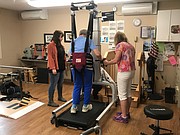Take a load off
By CHANSE WATSON
Managing Editor
SILVERTON — It’s no secret that it gets more difficult to move around as people get older. Seemingly simple tasks that were routinely performed in younger years become difficult challenges later on in life.
The Therapy Department over at the Silver Wood Good Samaritan Society in Silverton know this all too well. With the recent addition of a new piece of equipment, though, the Good Samaritan Therapy team is hoping to help their residents overcome some of these mobility challenges.
Received in late July, the LiteGait Partial Weight Bearing Assistive Device (or just LiteGait device) is designed to help appropriate residents improve their mobility and provide more therapy options for residents that need additional assistance, while reducing the risk of falling during rehabilitation. Physical therapists at Good Samaritan have been using the device for roughly a month now, after they were trained how to use it in late August.
Director of Rehab Christina Masterson explains that the device works by offloading or shifting the weight of the user, so they can focus on or avoid working certain areas while exercising.
“LiteGait accomplishes improved posture and more effective balanced/walking through the use of a harness that is then attached to a suspension system/supportive arms. The supportive arms offload different amounts of weight to different sides of the body (asymmetric support),” she said. “This effectively gives more support to where an individual needs it (i.e. if a person is weaker on one side as in a stroke, the system will provide more support to the weaker side. If a person has weight bearing restrictions, as in a hip surgery, we can get them standing without exceeding those restrictions).”
The extra support the device gives the user allows them to focus more on strengthening their lower body and core rather than compensating, and in turn, achieving goals of a normal, balanced and symmetrical walking cycle.
“It allows therapists to focus on a person’s posture, balance and walking without fear of the resident falling as they are suspended by the LiteGait,” Masterson said.
“Our LiteGait is complete with a BiSym system that allows us to know how much weight the LiteGait is offloading from the individual and a treadmill.”
In the past, before this device, therapists had to utilize other devices such as a walker or a cane to safely assist a patient by preventing falls. However, Masterson said these older methods makes it difficult to achieve a walking pattern where the patient is not leaning forward or compensating for a weaker side.
Kept in the facility’s gym, the LiteGait device can be useful to a variety of different residents including those who have suffered a stroke, have multiple sclerosis, Parkinson’s Disease, chronic pain (that limits walking), orthopedic issues (hip and knee surgery), or anyone else who may have strength and balance deficits due to a variety of diagnoses and comorbidities.
Masterson said the addition of the device will go a long way toward restoring the mobility of their residents and others in the community.
“There are residents in our facility that would like it learn how to walk again, but would be unsafe candidates for traditional therapy due to fall risk,” she said. “The LiteGait eliminates this risk and allows us to work with them safely, improving a resident’s independence, decreasing their fall risk, and improving their quality of life. The LiteGait also allows us to work with those that come to us from the community on walking/balance training earlier in the rehab process, allowing us to be a more effective and efficient rehab team.”
Coming at a hefty price tag of $19,000 (after a small discount), Good Samaritan received most of the funding to pay for the device from grants offered by local organizations. The Elks Community Rehab grant pitched in $10,000, the Hecla Charitable Foundation grant kicked in $5,000, and the Frank Morbeck Foundation grant covered $2,000.
In addition to these sums, more than $1,000 was raised through a community bake sale and raffle, and the remainder was covered by the Good Samaritan Therapy budget.
The Silver Wood Good Samaritan staff would like to thank Idaho Elks Rehabilitation, The Frank A. Morbeck Community Foundation, and Hecla Charitable Foundation for the grants received, as well as thanks to the community for their support during additional fundraising events to make the acquisition of this equipment possible.



